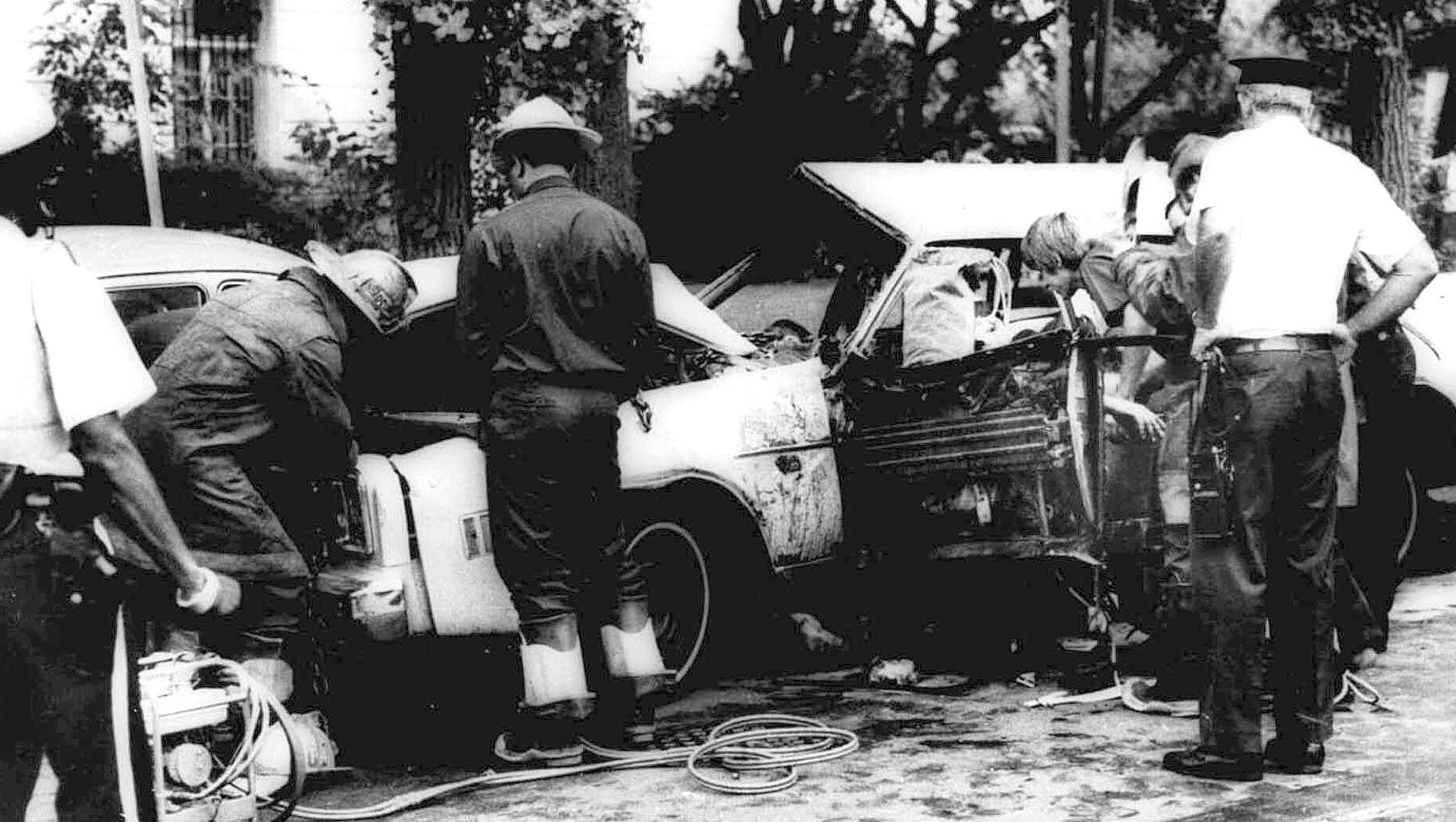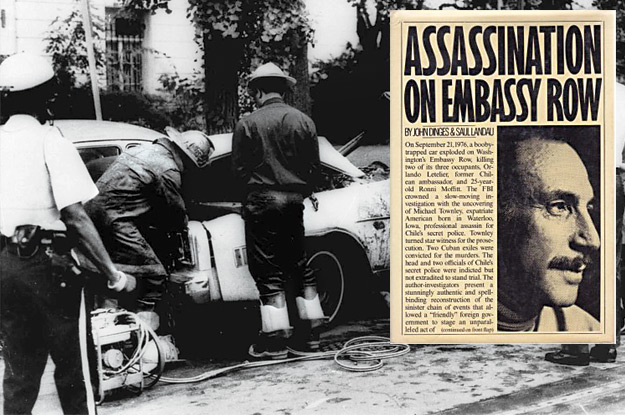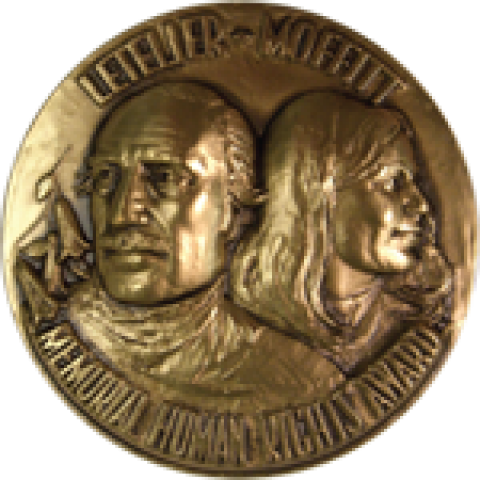Latin America
Related: About this forumThe Chilean president's D.C. visit took me back to Pinochet's rule
Gabriel Boric attended ceremonies for Salvador Allende, killed in the 1973 CIA-backed coup, and an exiled diplomat killed in Washington three years later
By Pamela Constable
September 25, 2023 at 3:21 p.m. EDT

Chilean President Gabriel Boric after laying a flower Saturday at the memorial to Orlando Letelier, an exiled former Chilean diplomat, and his American assistant, Ronni Moffitt, who were killed in a 1976 car bombing at Sheridan Circle in D.C. (Pamela Constable/The Washington Post)
At the edge of Sheridan Circle in Northwest Washington sits a tree stump crowned with an engraved stone disk. Barely noticeable to the drivers who whiz by on Massachusetts Avenue, the spot has poignant meaning for the crowd that gathers here every September to mourn twin tragedies in the modern history of Chile.
Fifty years ago this month, on Sept. 11, 1973, Chile’s armed forces, backed by the CIA, staged a brutal coup that overthrew the democratically elected socialist government in Santiago. President Salvador Allende was killed, and power was seized by the right-wing dictator Augusto Pinochet, who led 17 years of military rule — a period when thousands of Chileans were tortured, killed or disappeared.
Three years after the coup, on Sept. 21, 1976, a car bombing at Sheridan Circle killed an exiled former Chilean diplomat, Orlando Letelier, and his American assistant, Ronni Moffitt. The crime was ultimately traced to agents of Pinochet’s secret police.
I know about the annual ritual at the circle because I worked and lived in Chile as a journalist for long stints during the Pinochet era, during which I had some of the most horrifying and moving experiences of my career. Later, back in Washington, I attended the ceremony once or twice, briefly reliving the intensity of those times, but the news increasingly took me to other distant conflicts — especially after 2001, when the date Sept. 11 acquired a new notoriety, in the United States and around the world.
More:
https://www.washingtonpost.com/world/2023/09/25/chile-pinochet-coup-boric-letelier/
Or, without subscription:
https://web.archive.org/web/20230925205438/https://www.washingtonpost.com/world/2023/09/25/chile-pinochet-coup-boric-letelier/









(As the video mentions, Ronnie Moffit's husband, Michael Moffit, was also in the car, was injured, but survived it.)
Judi Lynn
(162,379 posts)By Kenneth Bredemeier
February 15, 1979
Three anti-Castro Cuban exiles were convicted yesterday on all counts in connection with the 1976 bombing assassination here of former Chilean Ambassador Orlando Letelier and a colleague.
The U.S. District Court jury of seven women and five men deliberated for 8 1/2 hours over the last two days and then told Judge Barrington D. Parker in a hushed courtroom that it had found the defendants -- Guillermo Novo Sampol, his brother, Ignacio Novo Sampol, and Alvin Ross Diaz -- guilty on all 15 charges that they faced stemming from the Embassy Row bombing death.
The killing of Letelier, one of the most ardent critics of the current Chilean military dictatorship of Gen. Augusto Pinochet, was the most notorious act of international terrorism ever committed here. Indeed, the jury accepted the government's contention that the Chilean secret police, once known as DINA, had masterminded the murder plot.
. . .
As they were led to the cellblock behind the courtroom, Ignacio Novo and Ross raised their fists and shouted: "Viva Cuba!"
The outcome of the case was presaged moments before the jury returned to the courtroom. Guillermo Novo looked at his friends in the courtroom and said in Spanish, "It's sure that they screwed us." As he made the comment, Novo drew a hand across his throat.
In rendering the guilty verdict, the jury accepted the contention of three young U.S. prosecutors -- Eugene M. Propper, E. Lawrence Barcella Jr. and Dianne H. Kelly -- that Letelier's slaying was carried out by the Cubans in conjunction with the government's key witness, Michael Vernon Townley.
A 36-year-old American-born DINA agent who refers to the Chilean secret police as "my service," Townley told the jury that he recruited the Cubans to help in the assassination mission on orders of his DINA superiors.
Townley pleaded guilty in August to murdering a foreign official in exchange for a government promise that it would recommend parole for him after he serve the minimum amount of 3 1/3-to-10-year sentence.
Townley, who has about 2 1/2 years to go on the terms, is not required by his plea bargain agreement to tell U.S. officials about any terrorist activities he might have committeed that do not involve U.S. citizens or were not committed in the United States.
More:
https://www.washingtonpost.com/archive/politics/1979/02/15/cuban-exiles-guilty-in-letelier-death/53ec3609-baee-485c-bed7-e9e0ac736a3a/
Same story, without a subscription:
https://web.archive.org/web/20211022192448/https://www.washingtonpost.com/archive/politics/1979/02/15/cuban-exiles-guilty-in-letelier-death/53ec3609-baee-485c-bed7-e9e0ac736a3a/


Guillermo Novo Sampol, Cuban "exile" assassin

Guillermo Novo Sampol, and his brother, Ignacio Novo Sampol

Ignacio Novo Sampol, on the left, in Miami


and Alvin Ross Diaz

Alvin Ross Diaz, Guillermo Novo Sampol, and his brother, Ignacio Novo Sampol
(Where have we seen a stupid lightning bolt, like the one in their group's emblem before? Duh.)
Judi Lynn
(162,379 posts)Pinochet ordered killing on US soil of Chilean diplomat
Source: Al Jazeera
Declassified US documents show that former dictator personally ordered killing of Orlando Letelier in Washington DC
General Augusto Pinochet ordered the 1976 assassination in Washington D.C. of a Chilean diplomat fleeing his dictatorship, according to declassified U.S. documents.
Orlando Letelier, who served as foreign minister under socialist president Salvador Allende, was imprisoned and tortured by the Pinochet government after Allende was deposed in a coup on Sept. 11, 1973.
He later went into exile in the United States, where he led resistance to Pinochet. In 1976 he was killed, along with Ronni Moffitt, his U.S. co-worker at the Institute for Policy Studies, by a car bomb detonated at Sheridan Circle in Embassy Row. Moffit’s husband, Michael, was seriously injured in the blast.
"There is a report from the CIA which is conclusive regarding Pinochet’s responsibility in ordering the assassination of my father. This is the first time there is evidence of this," Juan Pablo Letelier, a Chilean senator and a son of the victim, told Tele13 Radio on Thursday.
Read more: http://america.aljazeera.com/articles/2015/10/8/pinochet-directly-ordered-killing-on-us-soil-of-chilean-diplomat.html
More information in the thread:
https://www.democraticunderground.com/10141228516
Judi Lynn
(162,379 posts)which we never usually will ever know about:
On a fall morning in 1976, a bomb exploded in the middle of Washington. The shock waves were felt for the next 30 years.
The Atavist Magazine, No. 59
Shortly after 9:30 on the morning of September 21, 1976, a light blue Chevy Chevelle carrying three passengers moved along Washington, D.C.’s Embassy Row, merging into the flow of commuter traffic around Sheridan Circle. The man in the driver’s seat was Orlando Letelier, an economist and fellow at a left-leaning think tank, the Institute of Policy Studies. In the passenger’s seat beside him was 25-year-old Ronni Moffitt, a fundraiser at IPS, and behind her was her husband of four months, Michael Moffitt, also 25, a researcher working with Letelier on issues related to the future of Letelier’s native Chile.
It was a small miracle that Letelier was there in Washington that morning, working at IPS, commuting from the house he shared in Bethesda, Maryland, with his wife and four sons. Six years earlier, he had been a close confidante to Salvador Allende, the democratic socialist elected president of Chile in September 1970. For two years, Letelier served as Allende’s ambassador to the United States. In May 1973, he became foreign minister, and three months later, as right-wing resistance to Allende was intensifying, he was appointed defense minister, in charge of a military establishment openly hostile to the president.
On September 11, 1973, that hostility erupted into a deadly coup led by military leader General Augusto Pinochet. Allende’s three years in office had been marked by intense social instability, fomented in part by the United States, which since 1962 had been covertly financing newspapers, political parties, and, eventually, neo-fascist paramilitary groups as part of its covert war against leftist political movements in Latin America. That morning tanks surrounded Moneda Palace, the seat of Chile’s presidency. Just before noon, the Chilean air force began strafing the building. A firefight ensued between military forces and pro-Allende snipers positioned around the palace. Rather than be taken prisoner or forced into exile, Allende, holed up in La Moneda, took his own life.
Over the next few months, more than 1,200 people—leftist politicians and government officials, union leaders, activists, and students—were summarily executed. Many were arrested, brought to detention centers, and then murdered, their bodies flung across Santiago thoroughfares and dumped along urban riverbanks. On the morning of the coup, Letelier rushed to the Defense Ministry to try to restore order. In an interview published posthumously in Playboy in 1977, Letelier said that the moment he entered the ministry, he “felt a gun in my back” and was quickly “surrounded by ten or twelve men,” all pointing their weapons at him. He was taken into military custody. That night, from his holding room, Letelier watched nearly two dozen executions in the palace courtyard. At 5 a.m., he heard a commotion outside his room. “Now it’s the turn of the minister,” one soldier said. About 30 minutes later, a group of armed men entered his room, one carrying a blindfold. Letelier knew immediately what was coming. While he was being led to the courtyard, however, an argument ensued between two officers over who was in charge. Letelier remembered one of his captors saying, “You’re lucky. They won’t give it to you, you bastard.”
Instead he was flown with other prominent political prisoners to a detention center on Dawson Island, a frigid, forlorn place in the Strait of Magellan, closer to the tip of Antarctica than to Santiago. Letelier was beaten, threatened with execution, and forced to perform hard labor in subzero conditions. He remembered Dawson as “an inaccessible, frozen hell.”
After three months there, Letelier, malnourished and greatly weakened, weighed only 125 pounds. Another six months went by before he was transferred to a less punitive facility north of Santiago. A year after the coup, he was suddenly released from military custody and sent to Venezuela, where the powerful governor of Caracas had been lobbying for his release. He rejoined his family there and was offered the research position at IPS, which was hostile to the junta and critical of U.S. intervention in Latin America.
When the bomb went off in Sheridan Circle, Orlando Letelier’s Chevelle was lifted entirely off the ground, flames roaring from its windows. An explosive consisting primarily of C-4 had been attached to the car’s I-beam, directly beneath the driver’s seat. The flaming vehicle crashed into a Volkswagen in front of the Romanian embassy.
Michael Moffitt regained consciousness in the back seat, overcome by heat and the stench of burning hair and flesh. His shoes were blown off his feet; at first he had no feeling below the waist. Gasping for air, Moffitt pulled himself through a shattered window and saw his wife standing with her back to him. He moved to the driver’s side to check on Letelier.
Moffitt found Letelier facing backward and wedged between the steering wheel and the driver’s seat. The bottom of the car had been blown out, and Letelier had been rotated 180 degrees, folded over like a piece of origami. When Moffitt tried to lift Letelier out of the car, he saw that his body was completely severed at the torso. Letelier would die within minutes.
More:
https://magazine.atavist.com/codename-chilbom/